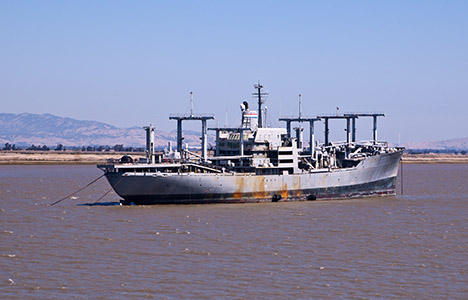For 40 years, the 57 decaying ships of the Ghost Fleet haunted the San Francisco Bay ecosystem. But before 2015 ends, all the ships will be gone.

The 57 decaying military ships of the Ghost Fleet poisoned the San Francisco Bay ecosystem for 40 years. Now, only five are left, and all will be gone next year. Photo credit: Baykeeper
By Deb Self
Published: December, 2014
For 40 years, the 57 decaying ships of the Ghost Fleet haunted the San Francisco Bay ecosystem. But before 2015 ends, all the ships will be gone.
The Ghost Fleet was a collection of long-defunct military ships from World War II and the Korean War. They were originally stored in Suisun Bay, a large northern inlet of San Francisco Bay, with the idea that they could be reactivated for wartime use. But as time passed, the fleet became a floating toxic waste dump. More than 20 tons of lead, zinc, copper, cadmium and other toxic substances fell, blew or washed off the ships into the water.
The ships are no longer poisoning San Francisco Bay, thanks to a successful lawsuit by Baykeeper and two other environmental groups, Arc Ecology and Natural Resources Defense Council. In 2010, Baykeeper and our partner organizations successfully reached a settlement agreement requiring the federal government to clean up and remove all the ships by 2017.
The cleanup is now two years ahead of schedule. Only five ships are left, and the worst ships are gone.
When the cleanup began, most of the ships were no longer seaworthy, and water had to be pumped from them regularly to keep them afloat. They leaked fuel and most were severely rusted, with peeling toxic paint. On our first inspection, walking on the decks, we could hear the crunch of hazardous paint chips and rust under our feet.
Pollutants in the mud directly below the Ghost Fleet were found to be in concentrations that exceeded California’s hazardous waste toxicity criteria. The levels were high enough for bottom-dwelling creatures to consume the toxins and introduce them into the Bay’s food chain.
Many species of wildlife were exposed to the toxics. Suisun Bay provides critical habitat for several species of endangered fish, including Chinook salmon and Delta smelt. The wetlands of Suisun Bay are home to hundreds of native bird species and an important feeding stop for thousands of migrating water birds.
Baykeeper’s cleanup agreement required the federal government to first remove loose and peeling paint from all the ships. Within a year, paint and rust chips were collected in barrels and taken to a hazardous waste disposal facility.
The government was also required to remove the worst ships first, to address the worst pollution threats as quickly as possible. Next, the agreement required controls to be put in place to prevent contamination from the remaining ships. As a result, the ongoing pollution has already been significantly reduced.
Baykeeper has inspected the ships each year and the cleanup has largely gone smoothly. When we have found problems with some ships, our recommendations for improvements were followed.
Most of the ships have been dismantled and recycled. Some have been dismantled locally at a former naval shipyard on Mare Island. One Ghost Fleet ship, the Iowa, was towed to Richmond and cleaned, and it is now open as a museum in Long Beach.
Although the Ghost Fleet will soon be just a memory, the danger of pollution remains. Since the cleanup began, more surplus military ships have been stored in Suisun Bay. Baykeeper will advocate for effective pollution controls on these additional ships, and if they start shedding toxics into the Bay, we will take legal action.
The Ghost Fleet cleanup is a San Francisco Bay success story. Experts estimate that the cleanup and removal of the Ghost Fleet has prevented an additional 50 tons of heavy metals from being blown and washed into the Bay. It’s a major victory for a healthier Bay ecosystem.
Deb Self is Executive Director of San Francisco Baykeeper, www.baykeeper.org. Baykeeper uses on-the-water patrols of San Francisco Bay, science, advocacy, and the courts to stop Bay pollution. To report pollution, call Baykeeper’s hotline at 1-800-KEEP-BAY, e-mail hotline@baykeeper.org, or click “Report Pollution” at www.baykeeper.org.

